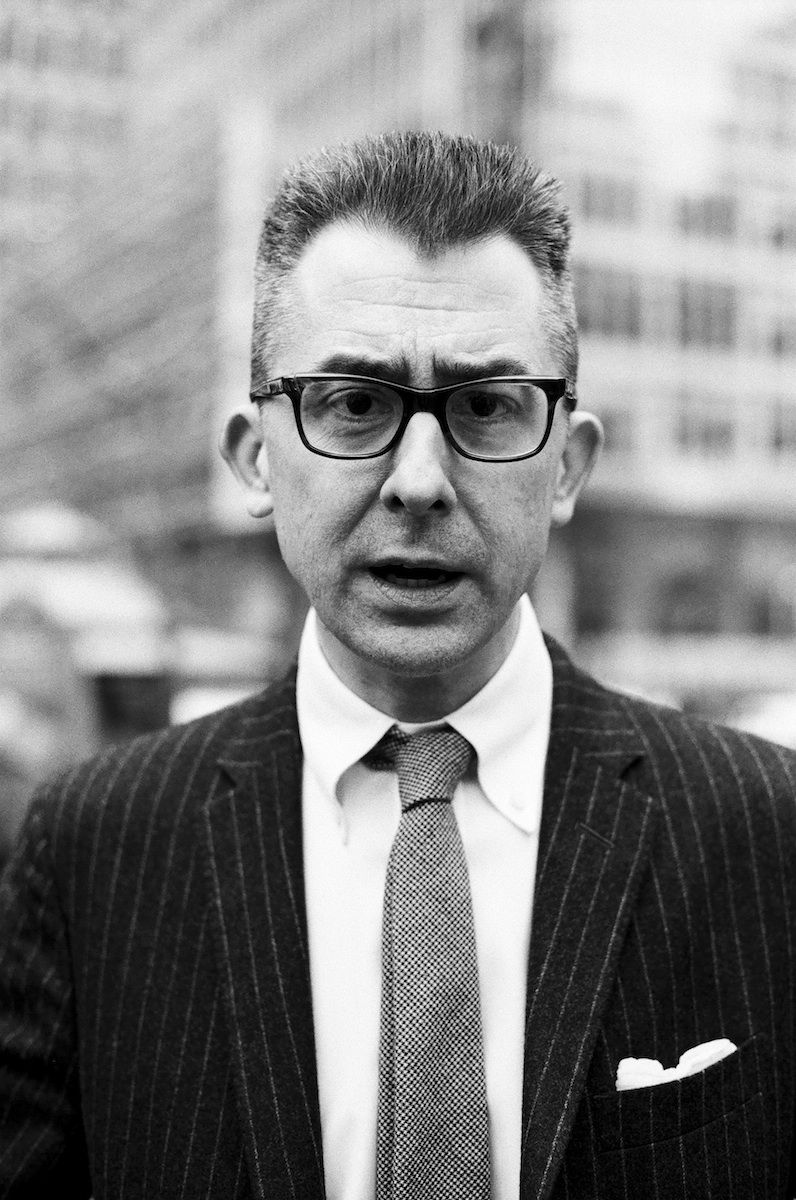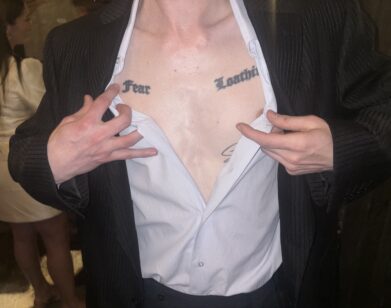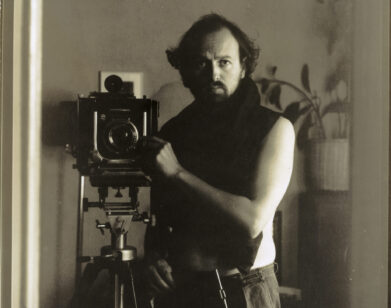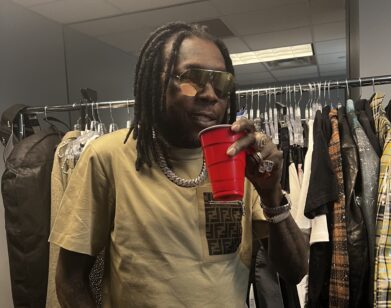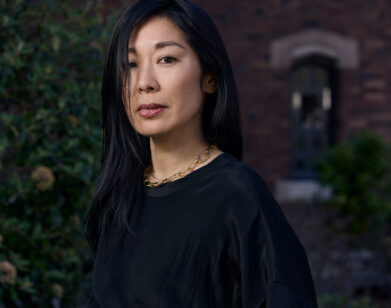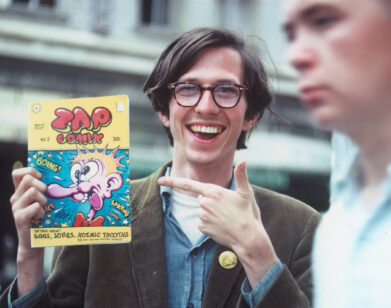Michael Hainey’s Visiting Hours
Ancestry.com, a website devoted the family-tree craze, offers as its motto, “Ready to discover your family story?” Writer and deputy editor of GQ magazine, Michael Hainey, already possessed all of the genealogical facts that site could offer. What he didn’t have was his family story. His first book, the recently released After Visiting Friends (Scribner), is a devastating, heat-seeking, investigative search for the truth of his father’s sudden, inexplicable death on a Chicago night in April in 1970, reportedly (depending upon who was doing the reporting) on the sidewalk after visiting a friend or friends.
Throughout his upbringing, Hainey didn’t know much more than the fact that his father had died away from home. Hainey’s family skirted the incident the way a person learns to step around a hole in the floor—an opening that will swallow you if you get too close to it. In his mid-30s, the writer began a private pursuit of the answer, falling into his father’s footsteps both metaphorically and literally. The elder Hainey was an assistant copy desk chief at the Chicago Sun-Times, and Hainey resurrects his father’s on-the-beat, ask-the-tough-questions reporter’s persistence. In After Visiting Friends, Hainey’s dogged journalistic approach brings him to family confidants, a Chicago morgue, his father’s high-school class reunion in Nebraska, the block on which his father died, and into the offices and bars of fellow hard-nosed newspapermen (some willing to talk, others defiantly protective).
Yet, there is another story flowing underneath the detective work: the private subterfuge of a family that protected itself from loss and perhaps prefers to leave the answers undiscovered. The gorgeousness of Hainey’s prose turns the search into an interior odyssey, to the limits of memory, to expiring minds that can no longer account for their undoing, to the dreams applied to family members who are no longer there. Ultimately, Hainey’s achievement resides in two inverse propositions: how little we know the ones we are closest to; and how much evidence, even 40 years later, remains about a person—ready to be uncovered with enough perseverance.
CHRISTOPHER BOLLEN: It’s tricky to balance a day job at a magazine that involves reporting and writing with a personal project in free hours that involves reporting and writing. Did you find yourself a different kind of writer when you sat down to work on the book?
MICHAEL HAINEY: I think the process is the same. It’s rigorous reporting and interviewing that goes into both. The tools are the same. But the style is completely different. From what I’ve seen from the reaction to the book, a lot of it is about the voice. It was almost musical to me—something I heard in my head—and I worked very hard on having the music just the way I wanted to hear it.
BOLLEN: As editors, we both have to do a lot of cutting and parsing of texts. Did you operate as an editor in the way you wrote—writing long and cutting out? Or did you start with an idea of reduction?
HAINEY: I write with compression and concision. As an editor, I just can’t stand when people go on. What I always wanted to be was a poet. I come to writing through poetry, and the lesson there is about concision and compression. There’s an idea that what someone says in two pages, you can say in two lines.
BOLLEN: I see the influence of poetry in the work, because it has a wonderful cadence. I think you can always tell a writer who appreciates poetry because of their awareness of the sound of the words strung together.
HAINEY: Poetry teaches word choice—words that emote feelings and images.
BOLLEN: What poets do you like?
HAINEY: There’s a whole range, but a few of the poets that have always been close to me are Seamus Heaney and Philip Larkin. Those are two of my favorites and, especially Heaney, his vocabulary is very tight. It’s also very image-driven. There are a few poems about his father and growing up as a boy, and the way he’s able to hit me with an image is so strong. I think a lot of what the book is about is images. And I think that’s what writing is for me. Do you want to say “I’m heartbroken,” or do you want to show than an image that would make them conjure being heartbroken? Then they feel it. I worked very hard to get that one-two punch.
BOLLEN: On my way to meet you today, I was reading a news piece about a female zookeeper who was mauled to death by a lion in California. She was cleaning a cage, and there was a smaller connecting cage where a lion named Cous Cous was confined. According to the paper, Cous Cous opened the separating gate with its paw and went in and snapped her neck with one swipe. There was a statement from the woman’s father about how much she loved cats, how much she wanted to be around lions, how it was her dream job. And I was thinking about your book, and I saw a connection. It’s often the very things that you’re compelled to get close to and research and step into a room with that can end up being your undoing. In your case, this secret of what happened to your father is the exactly what threatens to destroy your relationship with the rest of your family.
HAINEY: Right. There’s a risk.
BOLLEN: Was the topic of your father’s death something you always knew you were going to investigate one day?
HAINEY: I didn’t know I was going to do it, but I always thought about his death. I was obsessed with it. I’m very honest in the book that the sense of fear and danger that you talk about is what kept me from this journey, for 20 or 30 years. But I think I tried to be transparent about it because, while it’s a very personal story, it’s also a very universal story. We all have families, we all have secrets within those families, and yet we always want go in search of the truths that are inside those secrets. And as I make clear in the book, even once I discovered the truth, there was a good year or year and a half where I was frozen and I couldn’t tell my mother. I kept thinking, “I will be cast out.” It’s such a Biblical phrase, but it came to me at night: “I will be cast out.” I already lost one parent, by nothing I did, but maybe I’ll lose the second one now by something I do. I think the reason that the book is resonating to readers is because we all want to ask those questions.
BOLLEN: And there is such a tremendous friction between your responsibility as a reporter, which is to find the answer, and your responsibility as a son, which is to accept the preferred narrative of the family, or to protect the family from the truth of itself.
HAINEY: I think we all ask this question: “What’s my identity?” We keep talking about roles a lot, but there’s son, there’s writer, there’s editor, there’s spouse; and I think what I wanted to do is not write a book about me. I wanted to write a book about us: something everyone could see themselves in. So it’s a story of me searching for my father and what happened that night, but I wanted to articulate loss and absence and yearning and these larger themes of identity. The great trick is to get the reader to see themselves as you on this journey. And to be transported. What’s the great skill of literature? It’s to take the reader where they can’t go. Whether you’re on a raft down the Mississippi or a pilgrim to Canterbury, you are moving on this arc, but then hearing these stories as they unfold along the way.
BOLLEN: You decided not to be too confessional in your approach.
HAINEY: No, it’s more what we all want to ask, “Who am I? Where did I come from?”
BOLLEN: That’s why I think some of the most beautiful scenes featured your grandmother, as she gets sicker and nearer death. I think you hit an age in your mid-30s where you realize that the very people who can help provide you with the answers to those questions are disappearing fast.
HAINEY: I appreciate you mentioning my grandmother, because I begin the book with her. Before I had that scene where we are together, I didn’t know how to structure the book. The first page, to me, is the key to open the door, when she says, “There’s lots of stories you haven’t heard.” And look at how the book is structured—the stories loop you in the past, then call you to go forward. And you have to go into the past again to hear a story that allows you to move forward again. There’s one piece of this book that’s about reporting and newspapers. And what are the elements of great stories? Who, what, when, where, how, which come out of newspaper reporting. But the other reason I became a reader in the first place is that I just loved to listen to my grandmother tell me stories. Like how she can say in a story, “In 1917, we hanged the Kaiser in effigy.” As a little boy, I would just live to hear stories from old people about things that I didn’t know about. So in the book she’s struggling to hold onto memories, and I’m struggling to uncover them.
BOLLEN: So what specifically put the wheel in motion for you to stop wondering and obsessing and actually start investigating your father’s death?
HAINEY: One thing was my father died when he was 35. When I started to approach that age, it sparked a real crisis in me, because I always thought I wasn’t going to outlive him. Then I did outlive him, which caused something of a functioning breakdown at the time. I knew I needed to learn the story of the truth of that night. I needed to know because if you think about it, your stories are your identity. And our identity is bound up in our parents’ identity. If I didn’t discover a piece of my father’s story, I wasn’t going to know who I was.
I knew I needed to go into the past in order to go forward again. So I, that’s when I thought, “I’m going to start this search,” and it’s why the book unfolds the way it does, because I was writing it as I was doing it.
BOLLEN: One reason that your book caused me to decide never to have children is that you actually go back and mention your father’s early pieces he wrote for papers. I kept thinking, if I have children, they’ll dig up all of these terrible soft pieces I was forced to write in my early jobs at magazines. But your father’s early pieces are actually interesting. There’s a real reporter at work in them.
HAINEY: Imagine when they go look through your tweets.
BOLLEN: This is precisely why I don’t tweet! But it made me think about the difference between culture magazine writing and old-school newspaper writing. Your father was part of that romance of the tough school of journalism and the cigarette smoking to get the morning edition out. The book has a lot to do with that history of hard-nosed journalism. Did you come to see it as something of a lost art?
HAINEY: I love history, have always loved history. Maybe it stems from listening to my grandparents tell me about things that happened when I wasn’t alive, which was pretty fascinating to me. My mother started in the papers when she was 16. So in order to tell that story, I needed to know the world they worked in and the forces that were at work upon them. How could I not? So for me it was reporting and asking people, “Where did you have lunch? What did your living room look like?” It’s those elements that bring it alive.
BOLLEN: In looking for the answer to your father’s death, you sort of get a chance to behave like an old journalist—digging through old records, getting the scoop from people on the scene, hitting the streets….
HAINEY: A real reporter. Not just Googling things.
BOLLEN: Not just eating sushi while these recorders do my work for me.
HAINEY: Exactly.
BOLLEN: I really love the woman who works at the Chicago morgue who calls to give you a religious pep talk—
HAINEY: Jan. She’s pretty special. She was at one of my readings in Chicago. And Lynne was at another. Lynne worked in the hospital records department. Without Lynne finding those hospital records, I wouldn’t have uncovered the answer.
BOLLEN: That was unbelievable luck! It reminded me of that old Mark Twain quote, “The difference between fact and fiction is that fiction needs to be believable.” If you put that detail in a novel, the reader would never buy it.
HAINEY: I know. Even a couple of people said, “Really?” I’m like, “Yeah. Here’s their phone number, you can call them up.” One of the things about Jan and Lynne is that you have no idea of the people who are out there to help you, those who can help you, but you don’t even know they’re there until you start to take your journey and putting yourself on that path. I think when people ask me, “What was one of the best things about doing this book,” it was just meeting those two people.
BOLLEN: Obviously people have a fascination with knowing their roots, a sort of ancestry.com version of their past. But I think people forget about uncovering the intimate lives of their relatives and not just names and dates.
HAINEY: Ancestry.com is the simple version, like having your DNA broken down. What about, “Who was this person?” What do you really know about your parents before you existed? Someone said to me in Chicago, “You know your dad loved jazz. On Sunday afternoons he’d come over and listen to all these records.” I had no idea. And you don’t need to have a family secret to simply have a conversation with people in your lives. If you think about it, you know shockingly little about people in your family. Why do we hate Christmas? We go home and feel we’re with these strangers. No one fucking knows me there. My life is in New York. Do you lead the conversation? We’re all just waiting for someone else to ask us a question that allows us to talk about something.
BOLLEN: In some ways I’m actually a big believer in families not telling each other everything, in keeping some secrets, in maybe being like your mother and not pursuing the questions.
HAINEY: Why?
BOLLEN: Because there is something, like the way you did it, in finding out on your own. Maybe there is something to learning over time.
HAINEY: I think there’s a time and a place. I’ve gotten a lot of e-mails from readers who have shared stories about their families with me, about similar questions they had in their lives. I got this e-mail from a woman who, when she was like, five years old, her mother said her father died in a car crash. The woman said there was a gas station right next to her house, and she said, “Every day for two weeks I stood outside waiting for the tow truck to come with his car, and it never came. And so I never thought he died. It wasn’t until I was in my 30s that my mother told me he committed suicide.” And yes, the question is raised, “Can we tell a five-year-old child that their father committed suicide?” So there are degrees somewhere.
BOLLEN: Did you ever consider that your father killed himself? Was that ever a suspicion for you?
HAINEY: No, because the original story that said he died alone on the street. That was always troubling enough for me, because as a boy, I thought, he died alone, just out on the street.
BOLLEN: That’s a very lonely death.
HAINEY: And I was alone as a boy, and imagining him alone, that was too scary. And what I found out that he was with friends, I thought, “That’s good. Who are these people?” It had its own level of questions.
BOLLEN: It’s also interesting if you think about how different the book would be if your uncle had still been alive. I wonder if he would have been forthcoming or if he would have perhaps blocked those who did speak to you.
HAINEY: Yeah, there’s a lot of ifs.
BOLLEN: He’s an interesting figure because you also understand what he’s doing, why he’s protecting his brother and his wife’s brother and you and your brother.
HAINEY: Sure, I understand what he did. I think everyone was acting out of what they thought was right. The same with never telling me. I think everyone was acting out of noble intentions of protecting the family, even those who refused to speak to me. There’s a lot of moments in the book where people have to examine, “What would I do?” It’s a moral calculus, and we know what happens to the messenger. But I also think it’s never too late to have resolution. I don’t ever believe you close a door. What happens is we get to open another door and go through. We’re all jigsaws. You get missing pieces in your jigsaw. So you begin to fill in your blanks.
BOLLEN: Now that you’ve dealt with another side of the publishing industry, I want to ask if you were surprised at the difference between putting out a book and putting out a magazine? For instance, the difference is in the time it takes to make a book versus a magazine.
HAINEY: I sort of figured there’d be a different speed.
BOLLEN: But I bet your editors and publisher couldn’t believe how quickly you got back with your revision to their suggested edits. That’s one of the advanced skills of magazine journalism.
HAINEY: We talk about compression and concision, but, yes, magazine writing also teaches you about not being precious. As a magazine writer or editor you have to say, “Okay, I’ve got to cut 50 lines out of this, and I need to do it tonight. All right, let me look at it.” It’s my job to use my skills to make this tight and fit. And it so often better when you cut it.
BOLLEN: Yes. You see later how cutting something really improved it.
HAINEY: Angelina Jolie, that’s her motto. Cutters are good.
AFTER VISITING FRIENDS IS OUT NOW.

